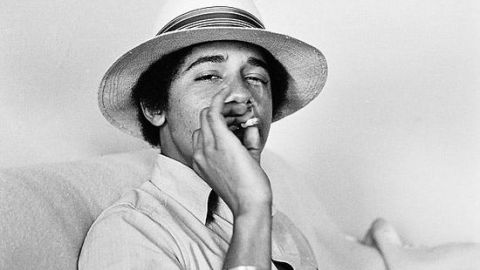Obama’s Pot Dilemma: Is It Time to Evolve?

What’s the Big Idea?
When the clock struck midnight this past Wednesday, dozens of pot smokers lit up in plain sight at Seattle’s Space Needle. At that exact moment, the state of Washington’s liberal marijuana law went into effect. No federal officials were in sight. No arrests were made, even though smoking marijuana in public is still subject to a fine in Washington. Law enforcement officials seem to want to stay as far away as possible from these types of celebrations, so as not to open up a legal can of worms.
Yet no one seems to be in more of a pickle on this issue than Barack Obama and Eric Holder. Federal law prohibits the possession of marijuana; state laws in Colorado and Washington, on the other hand, now allow it. So which laws should be enforced?
According to Ethan Nadelmann, executive director of the New York-based Drug Policy Alliance, this is not completely unfamiliar territory. After all, medical marijuana began to be legalized in various states back in the 1990s, and now 18 states plus Washington, D.C. have set up their own systems for regulation. Colorado, for instance, developed over the years what Nadelmann considers “a very good model for regulating above ground marijuana.”
In fact, Nadelmann sites the success of medical marijuana programs as one of the reasons why public opinion has shifted so dramatically in favor of outright legalization. So why mess with the states and the will of the people? Nadelmann, a leading expert on drug policy, sees evidence that Holder and Obama might be willing to move in a somewhat new direction.
Watch the video here:
What’s the Significance?
To get a better sense of what the White House will do, we need to deconstruct a recent New York Timesarticle that has been astutely described as a “trial balloon.” As Pete Guither observes, “there’s no better tool for official leaks than the New York Times, which has a policy against using unnamed government sources — a policy that it ignores constantly.”
The article in question describes the thinking of “Senior White House and Justice Department officials” who spoke on the condition of anonymity. These officials floated various courses of action — some of which are extremely aggressive — to test the public reaction, as Guither suggests.
So what have the reactions been? Here’s the liberal Huffington Post:
Here’s Obama supporter Andrew Sullivan:
Will Obama get the message?
To answer this, let’s ask a broader question. As the president looks at his second term and plots his legacy, will he “evolve” on drug policy the way he did on gay marriage? Nadelmann points out that this is an issue where the public is leading, not the politicians. A recent PPP poll shows that a record 57 percent of Americans now favor marijuana legalization and most expect federal prohibition to end within the next decade.
Of course, we don’t have to wait that long if Obama decides to lead on this issue now. And there are some compelling reasons for the first black president to do just that.
According to the U.S. Department of Justice Bureau of Justice Statistics, “at yearend 2010, black non-Hispanic males had an imprisonment rate (3,074 per 100,000 U.S. black male residents) that was nearly 7 times higher than white non-Hispanic males (459 per 100,000).”
This imbalance is largely due to the fact that drug laws are “disproportionately enforced against the poor and younger and darker-skinned members of society,” Nadelmann tells Big Think, and that has been the case from the origin of the War on Drugs to the way it is carried out today.
There is an enormous cost to taxpayers and individuals. As Nadelmann points out, incarceration destroys lives. A single arrest “can severely limit an individual’s ability to obtain housing, schooling, employment, and credit,” he says.
Does Obama want to be the president who puts an end to all that?
Image courtesy of Shutterstock
Follow Daniel Honan on Twitter @Daniel Honan





